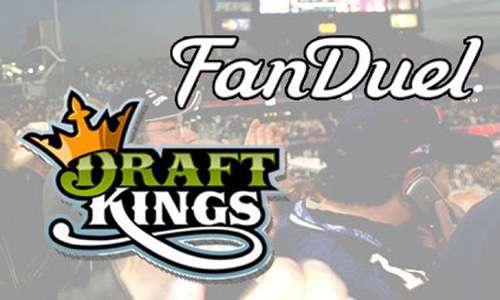DraftKings, FanDuel Agree to Merge into DFS Super Company
It was one of the worst kept secrets in the sports and gaming worlds, but daily fantasy sports (DFS) rivals DraftKings and FanDuel announced Friday that they have agreed to merge into a single company. According to a statement released by both companies this morning, the deal is expected to close in the second half of 2017, pending regulatory approval. In the meantime, the two will continue to operate as separate sites. Neither the name of the new company nor any financial terms have been disclosed.
David Purdum of ESPN.com reports that even though we don’t know how the dollars and cents are all going to shake out, sources with connections to the negotiations told ESPN that the merger will be a 50/50 split. The companies’ statement said that DraftKings CEO Jason Robbins will become the CEO of the new company and FanDuel CEO Nigel Eccles will be the Chairman of the Board. The board will be filled by three people from each company plus one independent director.
In their statement, the company gave some reasons for the merger:
The operational efficiencies and cost savings that are expected to result from the merger will drive a greater focus on developing new products and features, including more variety in contest formats, loyalty programs, enhanced social functionality and ancillary sports-oriented content and experiences, all aimed at creating a more diverse, exciting and appealing experience for fantasy sports players and all sports fans. The merger will also help the combined company accelerate its path to profitability.
The combined company will be able to invest in strategic partnerships across the sports ecosystem. Media, advertising and other partners will benefit from access to more products and customers as a result of DraftKings and FanDuel’s diverse user base and league relationships, as well as increased investment in advertising. Together, the combined entity can accelerate growth of the fantasy sports category, drive broader and deeper fan engagement, and more efficiently reach those players.
Purdum writes that among that “variety in contest formats” is season-long fantasy sports. The two companies have grown daily fantasy from nothing into a popular, yet still fairly niche, form of sports entertainment/gambling, but Purdum says that with an estimated player base of 40 million, season-long fantasy has eight times more players than daily fantasy.
 Both DraftKings and FanDuel added season-long fantasy-like options prior to his football season, allowing customers to form a league with friends to compete in daily fantasy contests while keeping track of results over the course of a full season for fun. They do not, though, have any real, paid season-long fantasy contests.
Both DraftKings and FanDuel added season-long fantasy-like options prior to his football season, allowing customers to form a league with friends to compete in daily fantasy contests while keeping track of results over the course of a full season for fun. They do not, though, have any real, paid season-long fantasy contests.
“We have always been passionate about providing the best possible experience for our customers and this merger will help advance our goal of building a transformational global sports entertainment platform,” said DraftKings CEO Jason Robins in the press release. “Joining forces will allow us to truly realize the potential of our vision, and as a combined company we will be able to accelerate the pace of innovation and bring a richer experience to our customers than we ever could have done separately.”
Now that the merger agreement has been signed, the final, or at least most significant, obstacle will be regulatory approval. Combined, the two companies have more than 90 percent of the daily fantasy sports market share, so single, DraftKings/FanDuel combo will have a near monopoly on the industry.
ESPN’s source believes that, contrary to what one might initially think, the merger could create more competition. Both DraftKings and FanDuel have had to spend millions of dollars paying lobbyists and fighting legal battles in a number of states; one of the motivators behind the merger was likely that they could join forces in theses fights and save on costs. The idea behind the merger being good for competition is that if it helps break down the regulatory and legal walls, the DFS industry could open up to many more entrepreneurs who won’t have to be afraid of legal problems.
A current competitor, DRAFT’s founder and CEO Jeremy Levine, even told ESPN that he is all for the merger.
“Prior to the tumult of the past year, FanDuel and DraftKings were well on their way to becoming multibillion-dollar pillar business[es] in sports,” he said. “There still will be massive business built in this space, but it won’t be FanDuel or DraftKings individually. Due to the merger, the opportunity is now there for the few companies that were able to survive and strengthen in the past year.”
“Being able to combine DraftKings and FanDuel presents a tremendous opportunity for us to further innovate and disrupt the sports industry,” said FanDuel CEO Nigel Eccles, echoing his new colleague’s thoughts. “While both companies have accomplished much already, this transaction will create a business that can offer a greater variety of offerings, appealing to new users, including the tens of millions of season-long fantasy players that haven’t yet tried our products.”
Featured image credit: Parekh Cards via Flickr



















COMMENTS